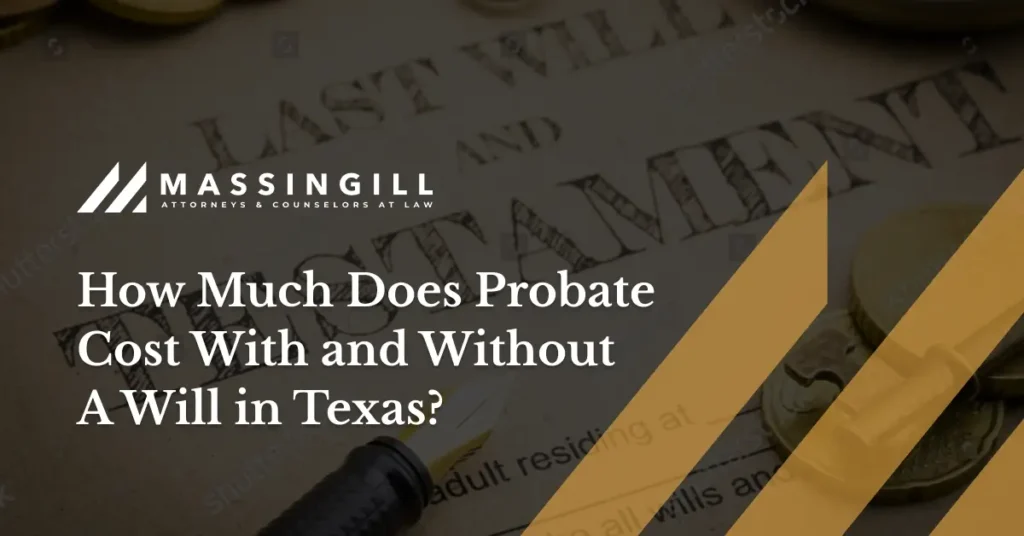
Writing a will can provide many benefits to our families once we pass on.
A will can prevent conflict between family members, clearly explain how property is to be distributed, and reduce our family’s costs in probate court.
Any one of these goals makes the initial effort well worth it.
Unfortunately, less than half of Americans have a written will. The reasons for avoiding writing a will are understandable. Nobody enjoys thinking about death, especially their own.
Properly writing and maintaining a will carry some upfront costs that might not seem worth it in the short run.
With these factors in mind, it is no wonder why most Americans procrastinate until it is too late.
However, when you don’t write a will, your family bears the cost. And, to make matters worse, probate costs are even higher when an estate must be probated without a will in Texas.
Before you delay writing your will any longer, you should understand the cost of probate in Texas with and without a will.
Below, the probate lawyers at Massingill go over the details of probating with and without a will in Texas. If you have any questions, please contact us today.
What Does It Mean to Probate an Estate?
When someone dies with an estate to pass on in Texas, the estate must go through probate. During probate, the assets are analyzed, and the decedent’s heirs are identified.
The probate process also serves to notify the public of the decedent’s death and ensures that all liabilities the estate is subject to are paid off.
Not all assets need to go through probate, but in most cases, an estate will have assets that need to be probated with or without a will.
An estate’s assets are transferred to the decedent’s heirs during the probate process.
How an Estate Is Distributed Without a Will
When someone dies without a will, they have died intestate. Texas has rules that dictate how the estate of an intestate decedent will be distributed.
The rules are very complicated and depend upon the familial status of the decedent when they died.
For example, most people assume a spouse will receive all property upon the death of their partner, but this is not always the case.
In Texas, the estate property is divided into community property and separate property.
The rules can be confusing even in a relatively simple situation in which a married couple has children and there are no children from other relationships.
In that case, the surviving spouse would get all community property and one-third of the separate property.
The surviving spouse will only get a life estate in one-third of the decedent’s land, with the rest split between the children.
This scenario demonstrates how complicated it is to determine how an intestate estate will be divided in Texas, even when the circumstances are simple.
Cost of Probate in Texas Without a Will
It is difficult to determine the total costs of probating an estate without a will in Texas. The cost of probate will depend on several factors.
First, bigger estates tend to cost more. However, even small estates can cost thousands of dollars to probate without a will.
Complicated family dynamics can also add time and complexity to the probate process.
Without the clear direction provided by a will, the court may have to put more time and effort into determining how to distribute the estate.
More time and effort lead to a higher probate cost in Texas.
In contentious cases, families may disagree about how the estate should be distributed and ask the court to determine who the heirs are.
While determining heirship, the court will appoint an attorney to represent unknown heirs. The estate pays the fees for the appointed attorney. These fees can be substantial.
Probating an intestate estate in Texas also adds a substantial time cost. Even simple estates can take six months or longer to probate when there is no will.
Large or complicated estates can take multiple years to go through probate.
How Much Does It Cost To Probate a Will?
The cost to probate a will in Texas is significantly lower than the cost to probate an intestate estate.
Most people who write wills in Texas elect to have the will administered independently.
Independently administering a will avoids many costs and fees associated with a probate process wholly administered by a court.
An independently administered estate will still need to go through probate.
However, once the administrator satisfies a few legal requirements, they are free to distribute assets without being micromanaged by the courts.
This saves both the courts and the beneficiaries time and money.
Writing a will also limits the ability of unhappy family members to contest the estate plan.
Properly executed wills can only be contested on a limited number of grounds, such as undue influence or lack of testamentary capacity.
These challenges can usually be avoided when an experienced attorney is involved in the estate planning process.
Probating an estate with a well-crafted will can also take much less time than probating an intestate estate.
Most estate plans can be probated within three to six months. This saves your family both time and heartache.
An Estate Planning Lawyer at Massingill Can Help
It is never too early to craft an estate plan. If you want to plan for your family’s future, Massingill can help.
We offer straightforward, flat-fee pricing and excel at making complex legal issues simple and approachable.
Our probate attorneys have experience in a broad range of estate planning matters.
Contact Massingill today so we can help you with all your estate planning needs.
Where You Can Find Our Austin, TX Office
DO YOU QUALIFY FOR PROBATE?
Fill out our quick questionnaire to determine if you need probate, what type of probate you may need, and estimated fees.

